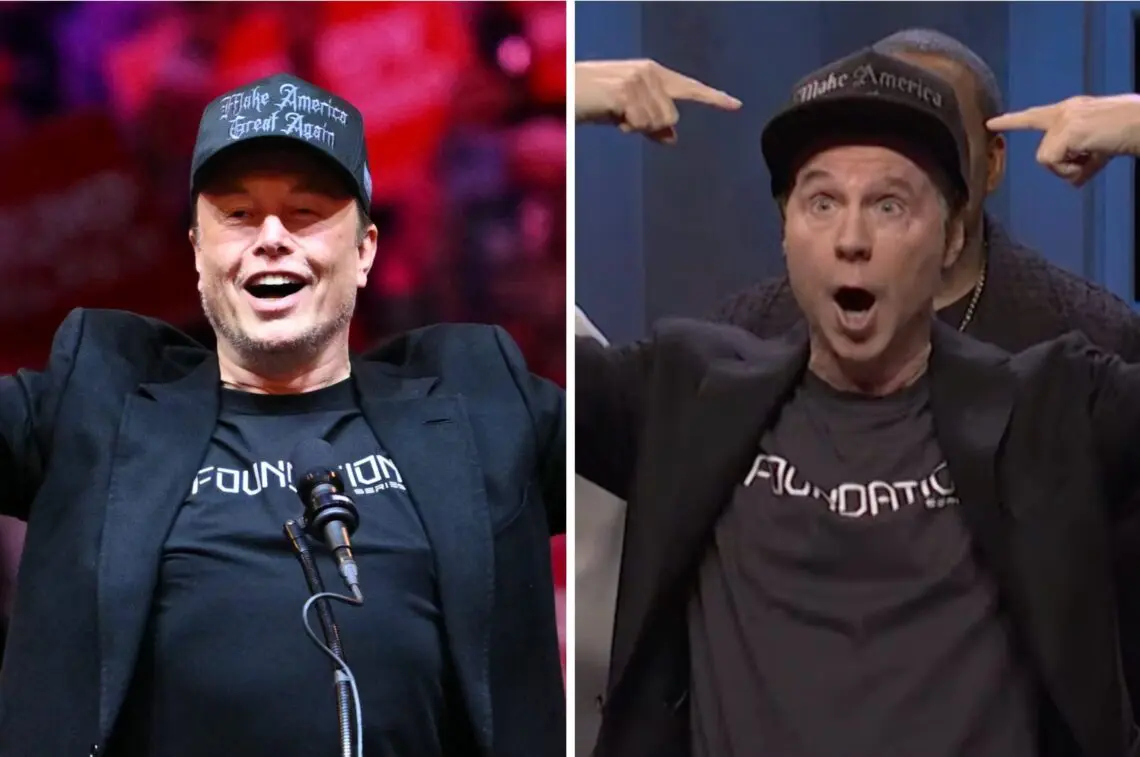Elon Musk critiques Dana Carvey’s portrayal on SNL
Elon Musk has made it clear that he is not a fan of Dana Carvey’s impression of him on “Saturday Night Live” (SNL). The tech billionaire expressed his discontent on social media, stating that Carvey’s portrayal lacks authenticity and fails to capture his essence.
Musk’s reaction on social media
Elon Musk, known for his candid and often controversial presence on social media, didn’t hold back his thoughts. In a recent post, he quipped, “Dana Carvey just sounds like Dana Carvey,” dismissing the authenticity of the impression. This comment was made in response to a clip from SNL’s cold open, where Carvey wore Musk’s iconic “dark MAGA” hat and enthusiastically chanted, “USA! USA!.”
A jab at SNL’s political commentary
Musk further elaborated on his views in a subsequent post about the appearance of a gothic Trump hat on SNL. He remarked, “They are so mad that @realDonaldTrump won,” accompanied by laughing emojis. This comment underlines Musk’s perspective that SNL’s political satire has become increasingly biased.
Hosting experience and further critique
Having hosted SNL in May 2021, Musk has firsthand experience with the show’s production dynamics. He didn’t stop at Carvey’s impression but extended his critique to the overall state of SNL. “SNL has been dying slowly for years, as they become increasingly out of touch with reality,” he stated. Musk also accused the show of attempting to manipulate equal airtime requirements to favor political candidates like Kamala Harris, which he believes backfired.
Carvey’s portrayal and its implications
Dana Carvey, a seasoned comedian, has been a notable presence on SNL. In the post-election episode of Season 50, Carvey donned the role of Musk. His portrayal included exaggerated dance moves, a thick South African accent, and Musk’s signature style. Carvey’s performance, meant to be a satirical take on Musk’s public persona, saw mixed reactions. Carvey humorously referenced Musk’s rockets, hinting at their advanced yet unpredictable nature, ending his act with, “See you in the White House!” while mimicking Musk’s chant from one of Trump’s rallies.
Broader context and industry trends
Reflecting on Musk’s critique brings to light broader trends in the entertainment industry. The intersection of politics and entertainment is not new, but as societal divisions deepen, the satirical representations on platforms like SNL often come under scrutiny. Musk’s comments also highlight a growing sentiment among some audiences that mainstream media, including popular television shows, might be losing touch with certain segments of the population.
The role of satire in modern media
Satire has always been a powerful tool in media, aiming to provoke thought and stimulate discussion. However, its effectiveness depends on the balance between humor and accuracy. Carvey’s exaggerated portrayal of Musk is a classic example of how satire can sometimes miss the mark, at least from the perspective of the subject being satirized.
It’s essential to consider the impact of such portrayals on public perception. For instance, while Musk’s critique might seem like a personal grievance, it also underscores a broader issue of how personalities in the tech and business sectors are represented in popular media. This representation can influence public opinion and spark debates about the fairness and accuracy of media portrayals.
The evolving landscape of political satire
Political satire, a staple of shows like SNL, has evolved significantly over the years. Initially serving as a light-hearted critique of political figures, it has now become a battleground for ideological clashes. Musk’s pointed comments about SNL’s political biases reflect a growing concern that satire is being used less for humor and more for political agendas.
The future of SNL and similar shows
SNL has been a cornerstone of American television, known for its comedic brilliance and cultural impact. However, as Musk suggests, staying relevant in a rapidly changing world is a challenge. Future episodes may need to innovate and adapt to retain their audience while ensuring that their satirical content resonates accurately with viewers from diverse backgrounds.
Sharing perspectives
Elon Musk’s criticism of Dana Carvey’s impression and SNL’s direction opens up a broader conversation about satire, media representation, and the intersection of entertainment and politics. As discussions continue, it’s crucial to engage with these perspectives and consider how they shape our understanding of influential figures and cultural trends.
Stay connected for more insights and discussions on the evolving landscape of media and entertainment. Share your thoughts and join the conversation on our social media platforms.

 Italian
Italian







